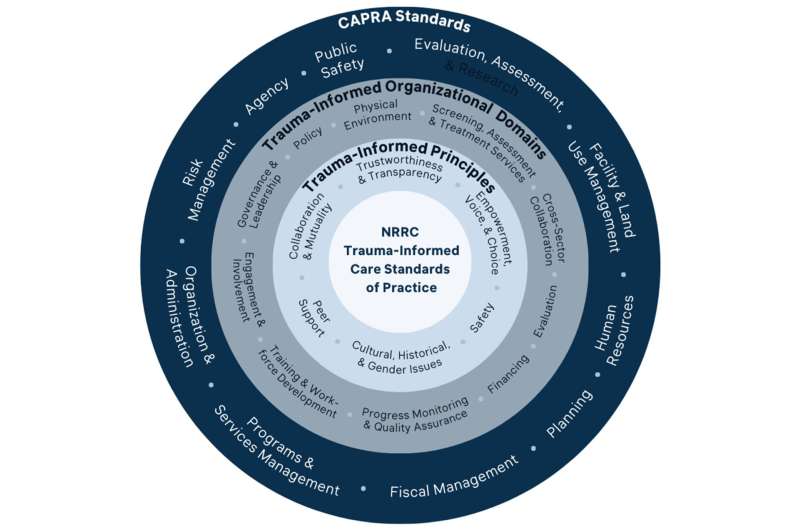This article has been reviewed according to Science X's editorial process and policies. Editors have highlighted the following attributes while ensuring the content's credibility:
fact-checked
trusted source
proofread
Transforming Cleveland recreation centers with trauma-informed care approach

Cleveland's recreation centers offer opportunities from cooking classes to robotics workshops. But Case Western Reserve University researchers found—through partnership and exhaustive examination—these community hubs serve another critical function: as safe spaces where children often vulnerable to trauma can heal.
Consider that one in four children experience at least one potentially traumatic event before age 16, according to the National Institute of Mental Health.
Working with officials from the city and the nonprofit Frontline Services, researchers at the university's Center on Trauma and Adversity helped transform the city's 22 recreation centers into trauma-informed Neighborhood Resource and Recreation Centers (NRRCs) over the past five years.
This approach recognizes that trauma can affect a person's physical and mental health and focuses on creating a safe and supportive environment to promote health and recovery.
"These are places where children, youth and adults can get the support and services they need in an environment in which trauma-informed care principles are fully embedded in the fabric of the culture," said Megan Holmes, associate professor and founding director of the trauma center at the university's Jack, Joseph and Morton Mandel School of Applied Social Sciences.
She said the trauma center applied a holistic approach to increasing awareness of how trauma affects the visitors. For example, the center's representatives know that the way to approach a teenager who's acting out is different than 20 years ago.
"Today, we consider neurobiology," Holmes said. "How a child responds to a stressful, potentially traumatic event is the body's normal response to an abnormal situation. Activities, whether it's bouncing a ball or connecting with people who care, are important elements of healing. The staff are all trained to respond in an approach that doesn't call out the child in a negative manner."
The center's findings, which outlines recommendations for future efforts, appear in the journal Behavioral Sciences.
The recreation center project began in the summer of 2018, when the city—under then-Mayor Frank Jackson—launched an ambitious plan to increase mental health services for Cleveland residents. The project's first phase involved training the rec centers' staff on trauma-informed care. From there the city hired a dozen social workers and counselors to work within city's recreation centers.
The second phase included developing comprehensive trauma-informed standards—including governance, policies and engagement—and developing tools to track and monitor progress.
"These are places where children in the city of Cleveland can go find both safety and people who genuinely care about them," Holmes said. "The idea is that this is a healing space. Recreation centers can be an organizational space where kids access these services for free."
Holmes said the trauma center team hopes to share the trauma-informed model and tools for rec centers with other cities.
More information: Megan R. Holmes et al, Innovations in Trauma-Informed Care: Building the Nation's First System of Trauma-Informed Recreation Centers, Behavioral Sciences (2023). DOI: 10.3390/bs13050394



















